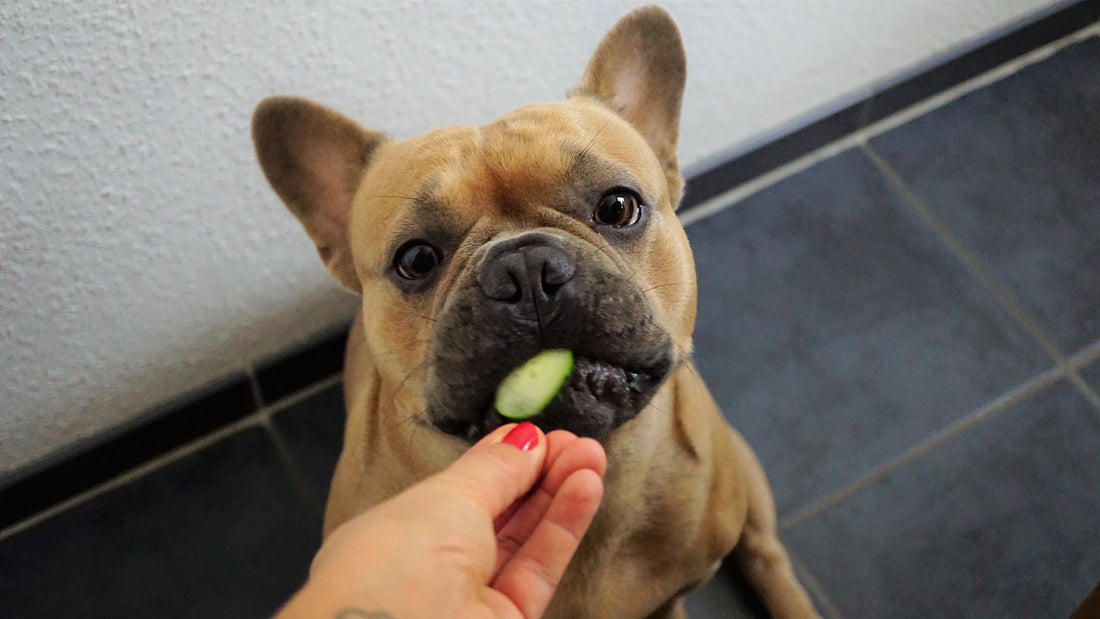
Introducing Fresh Food To Your Dog’s Diet
Share
How long has your dog been on their food? One Year? Two years? When you hear that dry kibble hitting the bowl, do you wonder if your dog is getting all the nutrition they need? You might also wonder if your dog actually enjoys eating the same thing every day.
There’s a lot of information out there about what your dog could, or should, be eating. Even the experts have different opinions on what the optimal diet should be. Raw food diets, grain free, ancestral, there are a ton of buzzwords to sort through.
If you are feeding your dog a high quality kibble, you can rest assured that all of his nutritional needs are being met. But what if you could make it even better? The truth is your dog can benefit from the addition of fresh foods in his diet.
If you’re ready to break your dog out of the rut of a basic kibble diet and introduce your dog to nutritious and fresh foods, keep reading to learn more!
Why Add Fresh Food To Your Dog’s Diet
It might shock you to know that even though dogs don’t mind eating the same thing everyday, they have a pretty diverse palette. Dogs love sweet things, which is why if you have a cat, you might catch your pup grazing on the cat food. Even though our dogs don’t have as many taste buds as we do, they can also taste salty and bitter.
Adding fresh food to your dog's kibble can make their food more nutritious by adding vitamins, protein, and fiber. It also adds some flavor so meals are more enjoyable.
Adding fresh foods is also good for dogs who are on a diet to lose weight. If you have had to cut the amount of kibble your dog is eating, he may still feel hungry. Topping off his dish with a low calorie, high fiber food like green beans will help keep your dog satisfied.
In addition to adding fresh foods to your dog's kibble, you can give it as treats. Baby carrots are a crowd favorite. Blueberries and apples also make great low calorie, vitamin-packed snacks. These delicious snacks are great for dogs who need to watch their calories and dogs who may have health issues like diabetes.
There are so many benefits to adding fresh foods into your dog’s regular routine. Wanna know more? Check out this guide to fresh and raw foods!
Which Fresh Foods Should You Add To Your Dog’s Kibble?
- Blueberries- These little guys are low in sugar and high in fiber and antioxidants. They’re great for helping support bladder function. You can add a small scoop of berries to your dog's food. You can also blend them with plain yogurt and freeze them for a treat.
- Sweet Potatoes- Loaded with potassium and vitamin B6, sweet potatoes add nutritious flavor to your dog's diet. Make sure you peel and cook sweet potatoes before you give them to your dog.
- Anchovies- Anchovies provide an immune boost, joint support, and important Omega3’s for brain health. Chop them up and mix them in with your dog’s kibble for some high quality protein.
- Organ Meats- Chicken and beef hearts are good sources of B vitamins and phosphorus, as well as essential fatty acids that help keep the skin and coat healthy. They also provide support for the skeletal system. In particular, liver adds iron and kidney is high in vitamin A. Organ meats are an excellent addition to your dog’s diet.
- Eggs- Eggs add amino acids and essential fatty acids that are good for the skin to your dog's food.They are a popular addition to canine diets since they help promote healthy skin and a shiny coat. Scramble or lightly boil eggs and mix them in your dog’s kibble.
- Bone Broth- Bone broth can be added to your dogs kibble like sauce or gravy, or fed to them on its own. The broth helps support the joints, make the coat shiny, and fight any digestive issues. Making your own bone broth means you can make it even more nutritious. You can add ingredients like ginger and turmeric as these are good for digestion and have anti-inflammatory properties. You can even toss in a little parsley to help with urinary tract and kidney health. You can learn even more about the benefits of bone broth here.
Other Fresh Foods You Can Add
- Chicken
- Carrots
- Watermelon
- Salmon
- Fresh bone marrow
What To Know Before Introducing Fresh Food
For your dog to get the maximum benefit of fresh food in his diet, you need to prepare things correctly.
Fruit can be served raw, just make sure to cut it into pieces small enough that they are not a choking hazard.
Most veggies are best lightly steamed or boiled to break down the fibers and make them easier to digest.
Even though there are a large number of fruits and vegetables that are healthy and beneficial to dogs, there are also some that are toxic to them. Before adding a new fruit or veggie, make sure it’s dog safe.
Some things never to feed your dog:
If you’re not sure about something, give your vet a call. They’ll be happy to advise you.
Ready to add a new fresh food into your dog’s regular routine? Remember to keep an eye on your dog as they first start eating a new, fresh ingredient. While there are many foods that are generally dog safe, your dog may be more sensitive to a certain food item. And no one wants an upset tummy!
